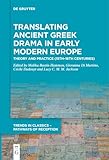Translating Ancient Greek Drama in Early Modern Europe : Theory and Practice (15th–16th Centuries) / ed. by Malika Bastin-Hammou, Giovanna Di Martino, Cécile Dudouyt, Lucy C. M. M. Jackson.
Material type: TextSeries: Trends in Classics – Pathways of Reception ; 5Publisher: Berlin ; Boston : De Gruyter, [2023]Copyright date: ©2023Description: 1 online resource (XVII, 344 p.)Content type:
TextSeries: Trends in Classics – Pathways of Reception ; 5Publisher: Berlin ; Boston : De Gruyter, [2023]Copyright date: ©2023Description: 1 online resource (XVII, 344 p.)Content type: - 9783110718652
- 9783110719314
- 9783110719185
- 882.0109
- online - DeGruyter
- Issued also in print.
| Item type | Current library | Call number | URL | Status | Notes | Barcode | |
|---|---|---|---|---|---|---|---|
 eBook
eBook
|
Biblioteca "Angelicum" Pont. Univ. S.Tommaso d'Aquino Nuvola online | online - DeGruyter (Browse shelf(Opens below)) | Online access | Not for loan (Accesso limitato) | Accesso per gli utenti autorizzati / Access for authorized users | (dgr)9783110719185 |
Frontmatter -- Acknowledgements -- Foreword -- Contents -- List of Figures and Tables -- Abbreviations -- Introduction -- Part I: Translating Comedy -- Aristophanes’ Readers and Translators in 15th-Century Italy: The Latin Plutus of MS Matrit. Gr. 4697 -- From Translating Aristophanes to Composing a Greek Comedy in 16th c. Europe: The Case of Alciato -- The Sausage-Seller Suddenly Speaks Vernacular: The First Italian Translation of Aristophanes’ Knights -- Part II: Translating Tragedy -- II.1: Scholarly Networks: Translation Models and Functions -- An ‘Origin’ of Translation: Erasmus’s Influence on Early Modern Translations of Greek Tragedy into Latin -- Imitation, Collaboration, Competition Between English and Continental Translators of Greek Tragedy -- Why Translate Greek Tragedy? Melanchthon, Winsheim, Camerarius, and Naogeorgus -- II.2: Proto-National Dynamics and Vernacular Translating -- Translating Ancient Greek Tragedy in 16th- Century Italy -- The Italian Translation of Euripides’ Hecuba by Michelangelo Buonarroti the Younger (1568–1647) -- Sophocles in 16th-Century Portugal: Aires Vitória’s Tragédia del Rei Agaménom -- Translating Ancient Greek Drama into French, 1537–1580 -- Part III: Beyond Translation -- Translation Ad Spiritum: Euripides’ Orestes and Nicholas Grimald’s Archipropheta (1548) -- Interpreting Oedipus’ Hamartia in the Italian Cinquecento: Theory and Practice (1526–1570) -- Coda: Dramaturgy and Translation -- Early Modern Iphigenias and Practice Research -- Afterword: Prospects for Pan-European Translation History -- List of Contributors -- Bibliography -- Index Nominum et Rerum -- Index Locorum
restricted access online access with authorization star
http://purl.org/coar/access_right/c_16ec
The volume brings together contributions on 15th and 16th century translation throughout Europe (in particular Italy, France, Spain, Portugal, Germany, and England).Whilst studies of the reception of ancient Greek drama in this period have generally focused on one national tradition, this book widens the geographical and linguistic scope so as to approach it as a European phenomenon. Latin translations are particularly emblematic of this broader scope: translators from all over Europe latinised Greek drama and, as they did so, developed networks of translators and practices of translation that could transcend national borders. The chapters collected here demonstrate that translation theory and practice did not develop in national isolation, but were part of a larger European phenomenon, nourished by common references to Biblical and Greco-Roman antiquities, and honed by common religious and scholarly controversies. In addition to situating these texts in the wider context of the reception of Greek drama in the early modern period, this volume opens avenues for theoretical debate about translation practices and discourses on translation, and on how they map on to twenty-first-century terminology.
Issued also in print.
Mode of access: Internet via World Wide Web.
In English.
Description based on online resource; title from PDF title page (publisher's Web site, viewed 26. Apr 2024)


